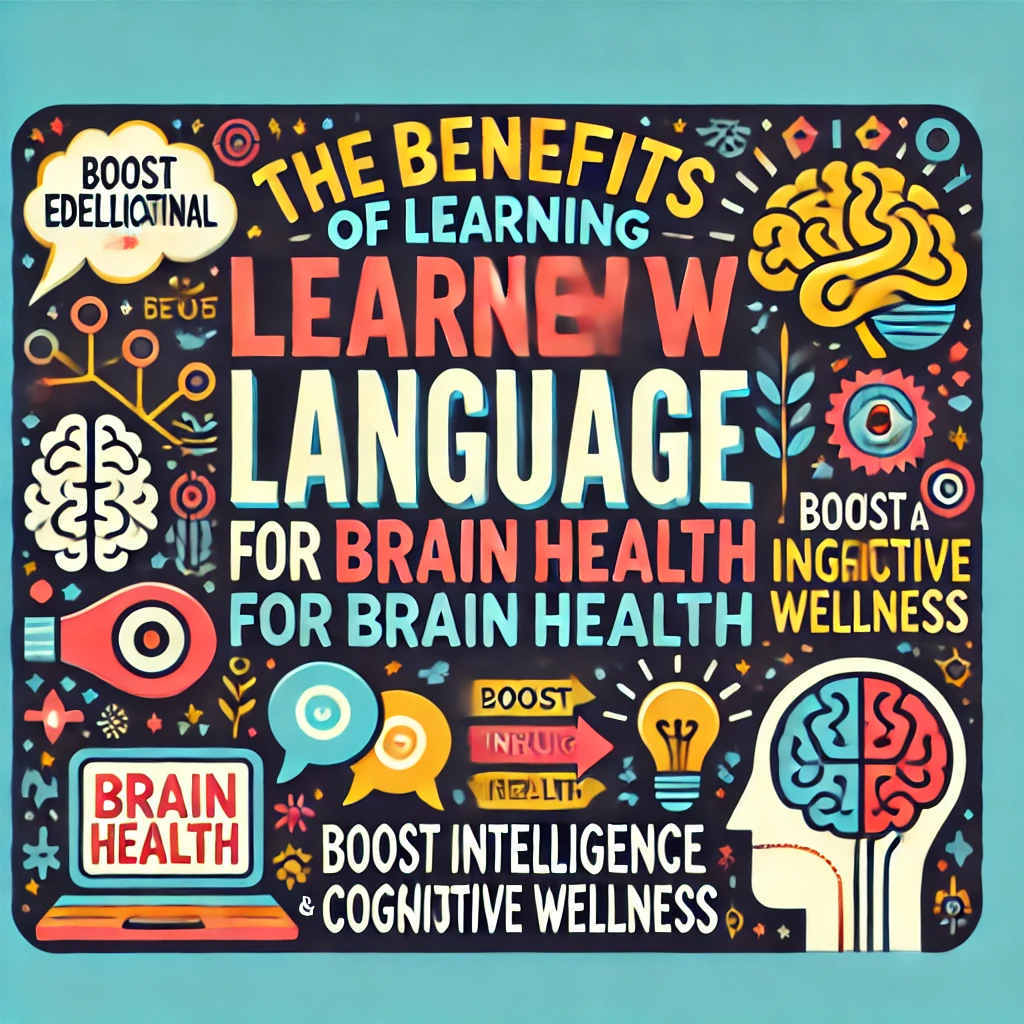Introduction
Learning a new language is more than just a skill—it’s a powerful way to boost brain health and intelligence. Science shows that bilingualism and language learning can enhance cognitive abilities, improve memory, and even delay the onset of cognitive decline. Whether you’re interested in French, Spanish, Mandarin, or any other language, the process of learning offers far-reaching benefits that go beyond just being able to communicate.
In this article, we’ll dive into the benefits of language learning for brain health, explore how learning a new language boosts intelligence, and provide tips on how to start your language-learning journey. You’ll discover that language skills not only open doors to new cultures but also unlock doors in your brain, enhancing memory, focus, and mental agility.
1. The Cognitive Benefits of Learning a Language
One of the most immediate benefits of language learning for brain health is the cognitive boost it provides. Studies show that people who speak multiple languages have more developed cognitive abilities and tend to perform better on tasks involving memory, attention, and problem-solving.
Cognitive benefits of learning a language:
- Improved memory: Learning a language strengthens memory by encouraging the brain to remember vocabulary, grammar rules, and pronunciation.
- Enhanced focus: Language learning demands focus and mental discipline, which improves overall concentration skills.
- Increased problem-solving skills: Translating between languages and understanding different grammar structures enhances problem-solving abilities.
Relatable anecdote:
A friend of mine began learning Spanish last year, and she noticed that her memory for other details improved, too. She could remember names, appointments, and even grocery lists more easily. She says learning Spanish “worked out” her brain in ways she didn’t expect.
Tips for building cognitive skills with language learning:
- Dedicate time each day to learn new vocabulary words and practice sentences.
- Practice speaking out loud to engage different parts of the brain associated with memory and auditory processing.
- Set small, achievable goals to keep you motivated and improve mental focus.
2. How Learning a New Language Boosts Intelligence
One of the most fascinating aspects of learning a language is its effect on intelligence. Research shows that people who engage in language learning experience increased mental agility and even higher IQ scores. The process of understanding new languages requires multitasking, pattern recognition, and memory—all of which contribute to overall intelligence.
How learning a new language boosts intelligence:
- Improves multitasking abilities: Bilingual people constantly switch between languages, training their brains to handle multiple tasks at once.
- Enhances cognitive flexibility: Learning a language challenges the brain to adapt and recognize new patterns, which is a hallmark of intelligence.
- Increases IQ: Studies have shown that bilingual individuals tend to have higher IQ scores, as language learning builds cognitive muscles.
Example:
I decided to start learning German as a personal challenge, and I was surprised by how much it improved my problem-solving abilities at work. Learning German grammar made me more adept at spotting patterns, which translated into better analytical skills in my job.
Practical tips for boosting intelligence with language learning:
- Try learning vocabulary that’s related to other subjects of interest, like science or history, to strengthen cross-disciplinary thinking.
- Practice code-switching, or alternating between languages, to train your brain in multitasking.
- Use language learning apps to build a daily routine, which will help you stay committed and see long-term cognitive benefits.
3. Language Skills to Improve Brain Function and Memory
Learning a new language isn’t just about memorizing words; it’s a full workout for your memory. Language learning involves repeated exposure, recall, and application of vocabulary and grammar, which strengthens both short-term and long-term memory.
Language skills to improve brain function:
- Strengthens working memory: Regular practice and recall of language skills enhance working memory, which helps in daily tasks and information retention.
- Boosts long-term memory: By consistently reviewing and using language, you build long-lasting memory pathways in the brain.
- Reduces risk of cognitive decline: Studies suggest that bilingualism may help protect against age-related cognitive decline and memory loss.
Relatable anecdote:
My grandmother, who’s fluent in three languages, has an amazing memory even in her 80s. She still practices each language regularly, which she believes has helped her retain her sharp mind over the years.
Tips for using language learning to enhance memory:
- Engage in regular, spaced repetition for vocabulary. Apps like Anki or Quizlet are great for this purpose.
- Practice “language immersion” by listening to music, watching shows, or reading in your target language to strengthen memory.
- Teach someone else what you’ve learned. Teaching is a powerful way to reinforce memory and solidify information.
4. How Language Learning Enhances Mental Agility
Language learning is a form of mental exercise that requires the brain to process and adapt quickly, enhancing mental agility. This skill can be especially useful in fast-paced work environments or when tackling complex tasks.
Impact of language learning on mental agility:
- Increases speed of information processing: Language learners often process information faster, as they’re trained to think on their feet.
- Improves adaptability: Switching between languages trains the brain to adapt, which can enhance flexibility in thinking and problem-solving.
- Boosts response time: Bilingual individuals tend to respond faster to visual and auditory cues, which can help in daily life and professional settings.
Example:
A colleague of mine speaks five languages, and she’s known for her quick thinking and adaptability at work. She attributes her mental agility to years of language learning, which trained her brain to process information quickly.
How to enhance mental agility with language learning:
- Engage in regular conversation practice with native speakers to build listening and response skills.
- Use language games like Scrabble or crossword puzzles in your target language to build quick thinking.
- Challenge yourself with complex sentence structures, which can help you think more flexibly.
5. Bilingualism and Brain Health Benefits
For those who become fluent in more than one language, the cognitive benefits only deepen. Bilingualism has been linked to greater brain density in areas associated with language and cognition, providing a protective effect against cognitive decline and diseases like dementia.
Brain health benefits of bilingualism:
- Increases brain plasticity: Bilingualism strengthens the brain’s ability to form new connections, keeping it adaptable and resilient.
- Delays onset of dementia: Studies show that bilingual individuals are less likely to experience age-related cognitive decline.
- Improves executive function: Bilinguals tend to have stronger executive function skills, which include focus, decision-making, and self-control.
Relatable anecdote:
One of my close friends, who grew up speaking both English and French, has an impressive ability to juggle multiple tasks. She believes that her bilingual background has given her a cognitive edge, especially as she’s gotten older.
Tips for reaping bilingual brain health benefits:
- Practice speaking both languages regularly, even if you don’t use them equally in daily life.
- Challenge yourself to think and respond in your non-dominant language to maintain brain flexibility.
- Play memory games in both languages to strengthen executive function.
6. Language Learning and Emotional Intelligence
Language learning isn’t just about cognitive skills; it also enhances emotional intelligence. Learning a new language opens doors to different cultures, helping you better understand diverse perspectives and communicate with empathy.
How language learning impacts emotional intelligence:
- Increases cultural awareness: Language is deeply connected to culture, so learning it helps you gain insight into the values and traditions of others.
- Improves empathy: Learning to communicate in another language requires patience and understanding, which fosters empathy.
- Builds better communication skills: Language learners often develop stronger interpersonal skills, which can improve relationships.
Example:
When I began learning Japanese, I gained a new perspective on communication and respect, which is deeply embedded in the language. This experience helped me become more mindful and empathetic in conversations, even in English.
Tips for using language learning to improve emotional intelligence:
- Explore the culture associated with your target language to gain a deeper understanding of its people and traditions.
- Practice speaking with native speakers to learn about their perspectives and experiences.
- Reflect on how learning a language has changed the way you view communication and relationships.
7. Long-Term Benefits: Protecting Against Cognitive Decline
Learning and maintaining a new language is like a mental workout that helps keep your brain healthy as you age. Studies show that lifelong language learners are less likely to experience cognitive decline and can often delay the onset of dementia by years.
How language learning protects against cognitive decline:
- Promotes neural growth: Language learning stimulates growth in brain areas associated with memory, focus, and decision-making.
- Strengthens neural pathways: Language skills reinforce pathways in the brain, making it more resilient to cognitive decline.
- Delays dementia onset: Bilingualism has been shown to delay symptoms of dementia by an average of four to five years.
Relatable anecdote:
I met a man in his 70s who still practices his Italian and French every day. He credits his language skills with keeping his mind sharp and active, and he plans to start learning Spanish next.
Tips for maintaining language skills for long-term brain health:
- Engage in regular language practice, such as conversation groups or online language exchanges.
- Keep learning new vocabulary and grammar rules to continuously challenge your brain.
- Embrace lifelong learning by exploring additional languages or dialects.
Conclusion
The benefits of learning a new language for brain health and intelligence are truly remarkable. From enhanced cognitive abilities and increased mental agility to long-term
protection against cognitive decline, language learning offers advantages that go beyond mere communication skills. Whether you’re considering becoming bilingual or learning a third language, the journey is well worth the effort for both your mind and your future.
Embrace the challenge, stay consistent, and remember that every new word, phrase, and conversation is a workout for your brain. With every practice session, you’re not only building language skills but also supporting mental clarity, focus, and resilience.
FAQ Section
1. How does learning a language improve brain function?
Learning a language exercises memory, focus, and problem-solving skills, which enhance brain function and overall cognitive health.
2. Can learning a language make you smarter?
Yes, language learning improves multitasking, problem-solving, and adaptability, which are all indicators of intelligence.
3. What are the cognitive benefits of learning a language?
Benefits include improved memory, enhanced focus, and better mental agility, which support brain health and cognitive resilience.
4. Does bilingualism delay cognitive decline?
Research shows that bilingual individuals often experience delayed cognitive decline and may be less likely to develop dementia.
5. How does language learning boost memory?
The process of learning and recalling vocabulary and grammar strengthens memory pathways, improving both short-term and long-term memory.
6. Can language learning enhance emotional intelligence?
Yes, language learning encourages empathy, cultural awareness, and interpersonal skills, all of which are aspects of emotional intelligence.
7. Is learning a new language a good brain workout?
Absolutely. Language learning challenges the brain to form new connections, reinforcing neural pathways and supporting mental clarity.
8. How can language skills protect against dementia?
Language skills strengthen neural networks, making the brain more resilient and potentially delaying dementia symptoms.
9. What’s the best way to stay motivated with language learning?
Setting small goals, practicing with native speakers, and immersing yourself in the culture can keep language learning engaging and rewarding.



